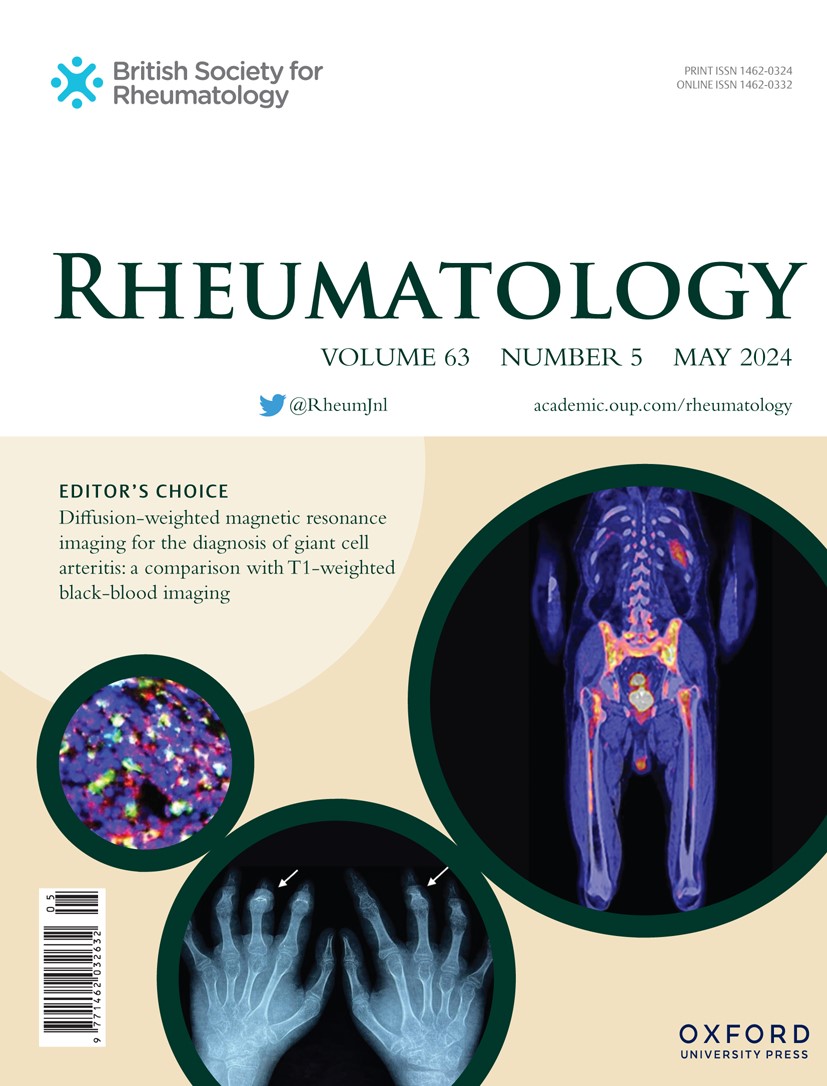抗磷脂综合征中针对溶血双磷脂酸的自身抗体的患病率和临床价值
IF 4.7
2区 医学
Q1 RHEUMATOLOGY
引用次数: 0
摘要
目的 评估抗磷脂综合征(APS)患者体内溶血双嗜酸自身抗体(aLBPA)的患病率和临床意义。方法 我们对91名持续存在常规抗磷脂抗体(aPL)的患者进行了回顾性分析:其中60名患者至少出现过一次APS临床症状(症状组),31名无症状(无症状组),以及33名aPL阴性对照组。血清样本中 aLBPA 的检测采用专门为本研究设计的酶联免疫吸附试验 (ELISA)。结果 持久性 aPL 患者的 aLBPA 患病率明显高于对照组(p< 0.0001)。在持续性 aPL 患者中,我们的研究结果显示,无症状患者的 aLBPA 患病率明显高于有症状的患者(p= 0.027)。值得注意的是,仅 IgG aPL 阳性的患者更有可能出现提示 APS 的临床事件。结论 aLBPA 和传统 aPL 的联合检测可用于对持续性 aPL 患者进行分层。这种联合方法可作为治疗这种复杂的自身免疫性疾病的重要工具,特别是在指导无症状的持续性 aPL 患者启动初级血栓预防措施方面。本文章由计算机程序翻译,如有差异,请以英文原文为准。
Prevalence and clinical value of autoantibodies directed against lysobisphosphatidic acid in antiphospholipid syndrome
Objectives To assess the prevalence and clinical significance of autoantibodies against lysobisphophatidic acid (aLBPA) in patients with antiphospholipid syndrome (APS). Methods We conducted a retrospective analysis involving 91 patients with persistent conventional antiphospholipid antibodies (aPL): 60 patients with at least one clinical event of APS (symptomatic group) and 31 without (asymptomatic group), as well as 33 aPL-negative controls. Detection of aLBPA in serum samples was performed using an enzyme-linked immunosorbent assay (ELISA) specifically designed for this study. Results The prevalence of aLBPA is significantly higher in patients with persistent aPL than that of the control group (p< 0.0001). Among patients with persistent aPL, our findings reveal a significantly higher prevalence of aLBPA in asymptomatic patients compared with their symptomatic counterparts (p= 0.027). Notably, patients positive for IgG aPL alone demonstrated a greater likelihood of presenting clinical events suggestive of APS. Conclusion The combined assay of aLBPA and conventional aPL could be used to stratify patients with persistent aPL. This combined approach could serve as a valuable tool in the management of this complex autoimmune disease, particularly in guiding decisions regarding the initiation of primary thromboprophylaxis in asymptomatic patients with persistent aPL.
求助全文
通过发布文献求助,成功后即可免费获取论文全文。
去求助
来源期刊

Rheumatology
医学-风湿病学
CiteScore
9.40
自引率
7.30%
发文量
1091
审稿时长
2 months
期刊介绍:
Rheumatology strives to support research and discovery by publishing the highest quality original scientific papers with a focus on basic, clinical and translational research. The journal’s subject areas cover a wide range of paediatric and adult rheumatological conditions from an international perspective. It is an official journal of the British Society for Rheumatology, published by Oxford University Press.
Rheumatology publishes original articles, reviews, editorials, guidelines, concise reports, meta-analyses, original case reports, clinical vignettes, letters and matters arising from published material. The journal takes pride in serving the global rheumatology community, with a focus on high societal impact in the form of podcasts, videos and extended social media presence, and utilizing metrics such as Altmetric. Keep up to date by following the journal on Twitter @RheumJnl.
 求助内容:
求助内容: 应助结果提醒方式:
应助结果提醒方式:


